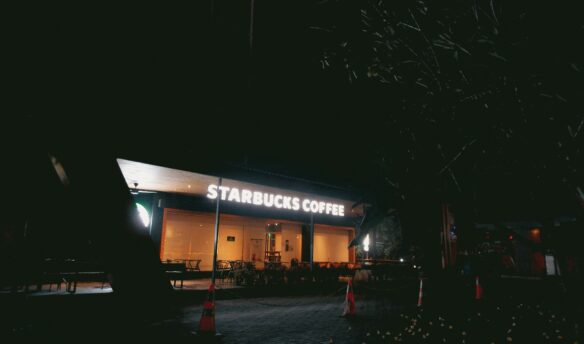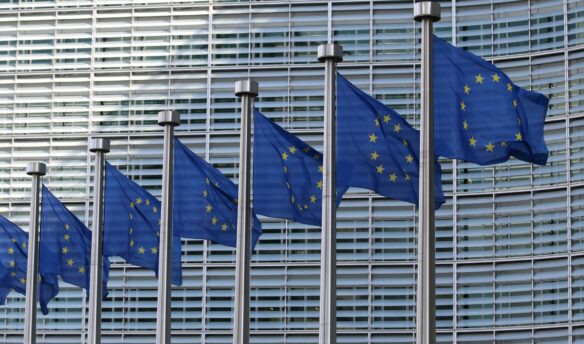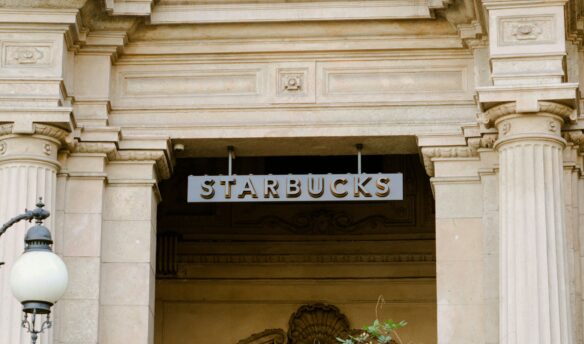Blank Street introduces its newest invention: the coffee shop. Plus, Indian coffee farmers plan an election protest, The Wydown Coffee Bar closes abruptly days before a union election, and celebrity coffee brands are getting out of hand.
“We Have No Option’: An Election Protest Brews in Indian Coffee Capital’ – via Al Jazeera
Coffee from Araku Valley in western India’s Andhra Pradesh state is highly sought-after. Like Hawaiian Kona or Jamaica Blue Mountain, the region’s name has become a brand. In 2019, Araku Valley coffees received a Geographical Identification tag (similar to how for something to be labeled Champagne, it must come from the Champagne region of France). G20 nations leaders received Araku Valley coffee at a recent summit as a gift.
Araku Valley coffee can fetch upwards of $70 per kilo on the international market, but the farmers who grow the crop earn $.60 or less per kilo, and many lack clean drinking water and toilets. These conditions are driving farmers to use their voting power to protest.
India is in the middle of a seven-week general election, voting on candidates for all 543 seats in the nation’s Lok Sabha, or the lower house of Parliament, including the Prime Minister. Many Araku Valley residents plan to protest what they describe as a lack of investment in their region by selecting “None of the Above” (NOTA) as their candidate of choice.
The NOTA option was first introduced in 2013 as a way for Indian voters to express their displeasure with the government. This is not the first time residents of Araku Valley have protested this way: in 2019, NOTA received a higher share from Araku locals than votes for both India’s biggest parties combined.
Al Jazeera reports that disillusionment has only increased since 2019. Araku Valley residents, of whom nearly half work in the coffee industry, lack basic infrastructure like roads, electricity, and plumbing. There is one primary health center for 96 villages, and it lacks medical staff. “We are completely justified in pressing NOTA because it gives a clear message to the political parties that they have failed,” one resident said.
But farmers in the area aren’t just upset with the government—they’re angry with their region’s established systems that dictate how coffee is bought and sold. For example, the region’s local cooperative, which supports 100,000 farmers and supplies farmers with seedlings and training, pays what one farmer calls “a pittance.”
Nava Roja, a coffee farmer in the Araku Valley, produces around 300 kilos of coffee cherry each year and gets $.60 per kilo from the cooperative. Annually, she’s earning $180, while exporting companies sell roasted beans from the region for $30-72 per kilo. “It is very difficult to survive with such a meager amount in the face of growing inflation,” she said.
Many coffee producers will vote NOTA to raise awareness of their abysmal conditions. Al Jazeera notes, “The farmers insist that they are not asking for much—better prices for their coffee berries, roads and medical facilities—and toilets.”
‘Coffee Chain Blank Street Opens ‘The Green Room’ as Innovation Cafe’ – via Restaurant Business Online
The tech world loves to claim things that already exist and call them “innovations.” Elon Musk’s Boring Company wanted to build underground tunnels that would whisk passengers around in high-speed pods—or a subway; Uber Pool Express, which the company called a “carpooling service targeted at commuters,” is basically just a bus, and now Blank Street Coffee has announced a new concept store that is basically just a regular coffee shop.
Blank Street, a venture capital-backed startup coffee shop that debuted in 2020 and has over 50 locations in New York, London, DC, and Boston, expanded quickly using kiosks and a high-volume service model. According to the New York Times, most Blank Street locations are “cozy pod[s] built around a high-volume automated Eversys espresso system, designed to get customers in and out quickly and to allow baristas to focus more on customer service than on coffee.”
The brand’s new concept store, The Green Room, differentiates itself from past Blank Street locations with a rotating lineup of signature drinks, an all-day breakfast menu, and “an enhanced customer experience.” The Green Room takes its name from show business vocabulary—the green room is where actors and performers hang out before taking the stage. Restaurant Business Online reports that Blank Street “intends this location to be a place where guests get ready for their day.”
Jai Lott, Blank Street’s VP of food and beverage, says The Green Room “will be our space to invest further in innovation across the customer experience.” Innovations at the Green Room include espresso “served in a demitasse cup with a side of effervescent water on a stylish tray,” warm chocolate croissants, and breakfast sandwiches. Sound familiar?
According to Restaurant Business Online, the interior has a “zen-like vibe,” and baristas at The Green Room receive “advanced training compared to the teams at other Blank Street locations.”
Employees at other Blank Street locations have unionized over the past year, calling out the company’s continuous understaffing issues and lack of support. “[Blank Street] didn’t mention that you’d have to basically be managing your store,” one employee told HuffPost, noting that many stores only have one employee on the floor during shifts.
Blank Street seems to acknowledge that many of its stores operate without a leader. In the Restaurant Business Online article, author Patricia Cobe writes, “The Green Room is the only [Blank Street] café that boasts a single unit manager.” Cobe shares a novel detail of The Green Room: “[Manager Jay] Baez is present to oversee operations every day.”
More News
‘Busan Aims to Become Korea’s Coffee Capital with “Coffee City Busan” Initiative‘ – via STiR Coffee and Tea
‘Guatemala Coffee Report: New Map for World’s Fourth Largest Arabica Producer’ – via Daily Coffee News
‘The 2nd Annual Café Collectif Is Coming To Montreal’ – via Sprudge
‘Melitta Group Acquires Majority Stake in South Africa’s Caturra‘ – via World Coffee Portal
‘Global Center for Circular Economy in Coffee Launches, Seeks Members‘ – via Daily Coffee News
‘World of Coffee Jakarta Announced for 2025‘ – via Global Coffee Report
‘Juan Valdez and Green Coffee Company Ink Deal for US Coffee Sales’ – via Daily Coffee News
The Week in Coffee Unionizing
In April, workers at The Wydown Coffee Bar in Washington, DC, announced their intent to unionize. Staff cited mismanagement, mistreatment, and low pay among their reasons for organizing. When company ownership chose not to voluntarily recognize the union, organizers filed for an election with the National Labor Relations Board.
Less than a month later, just five days before the scheduled vote, Wydown’s ownership abruptly closed both locations. The ownership posted a notice on the cafe doors and on the company website, claiming that the decision to close had been ongoing since last year. However, organizers had other theories about timing.
“[Wydown owners] Chad and Alex McCracken would rather put 30 people out of work than face a union election,” the union wrote on Instagram. Wydown workers have started a GoFundMe to cover lost wages and help pressure the owners to reopen.
“The ballots were going to be mailed out five days from now, and it seems to us that once they heard about the potential for a union, they kind of stayed quiet, planned this out and made sure to execute it right before we would be in a position to negotiate,” former employee Christopher Chandler told NBC Washington. An attorney for the owners denied that the unionization was behind the decision to close.
Wydown workers planned to unionize with Workers United, and the group released a statement to NBC citing Wydown’s decision to close as an example of why workers are organizing. “If they had a voice and a seat at the table, they could have shared the burden of whatever the issue is. Instead, workers are left feeling blindsided and treated without respect.”
The Week in Celebrity Coffee Brands
Here at Fresh Cup, we like to keep you up to date on the newest celebrity coffee brands. Usually, a new launch gets a passing mention, but this week, there were so many new celebrity names in the coffee game we had to give them their own section:
- The band Green Day opened a coffee company, Oakland Coffee Works, in 2015. Now, they’ve merged with an Ohio-based coffee roaster called Caruso Foods to create a new entity, Punk Bunny Coffee. The band is about to go on a world tour, and according to lead singer Billie Joe Armstrong, “Punk Bunny Coffee will be fueling the way, backstage and on our buses.” The new brand, which includes Rachael Ray and actor Adam Devine as investors, also will partner with Keurig to produce Punk Bunny pods.
- Kansas City Chiefs quarterback Patrick Mahomes is the face of a new ready-to-drink iced coffee company, Throne SPORT COFFEE (no need to yell, Patrick). According to the brand, this is not just iced coffee: this is COFFEE PLUS+! The new beverage includes “natural” caffeine, electrolytes, daily B vitamins, natural flavors and natural sweeteners. “I am proud to be part of Throne SPORT COFFEE and to launch and introduce a better iced coffee to the masses,” Mahomes said in a press release. “We have been working on creating the perfect product for those who are always on-the-go, who are looking for a natural energy source with added benefits and I couldn’t be more excited about being in on the ground floor of building this brand.”
- Finally, and weirdest of all, former New York City mayor Rudy Giuliani, currently bankrupt and facing a defamation lawsuit judgment of $148 million, has started selling coffee. Those interested in sampling Rudy Coffee can grab a two-pound bag of Fighting For Justice dark roast, America’s Mayor morning coffee, or Enjoying Life decaf for $29.99. In a sign of just how meaningless those words have become, all the bags are labeled “organic,” “100% arabica,” and “speciality.” Maybe someone should have told him how hard it is to make money in the coffee industry. The New Republic notes that Giuliani would need to sell nearly 5 million bags to recoup enough to pay that $148 million defamation bill. However, that “doesn’t include any of his other legal fees or pending civil cases against him.”
And we didn’t even get to the Green Mountain and Kevin Costner collaboration. Judging by this flurry of activity, perhaps we should shut down the celebrity coffee cash-in/side hustle/grift industrial complex until we can figure out what’s going on. It seems to be getting a little out of hand.
Is Coffee Good For You?
Chances are, if you’re reading this, you drink a lot of coffee. And if you drink a lot of coffee, chances are you’ve dealt with the frustration of coffee staining your teeth. But did you know the type of coffee you drink impacts how your teeth are affected?
Coffee is on the acidic end of the pH scale (which goes from 0 to 14, with seven being neutral), sitting between 4.9 and 6.2. Below 5.5, food and beverages break down tooth enamel, increasing the chance of staining.
Dark roasts (and cold brew) are better for your teeth because they’re less acidic and generally register a higher pH level. The roasting process breaks down acids over time, so lighter-roasted coffees contain more acids than darker roasts.
According to an article in Inverse via Sprudge, adding milk to your coffee can help mitigate its impact on your teeth. Milk has a higher pH and essentially waters down the acidity in the coffee (water also works). That’s backed up by science: a 2022 study found that adding milk or water to coffee reduces tooth staining.
Another trick? Drink faster. Coffee temporarily changes your mouth’s pH, which averages around 6.7, so the quicker you drink, the shorter that change lasts. If you take a couple of hours to enjoy your coffee, “you’re presenting your teeth in your mouth with constant attack of acid,” according to a dentist interviewed by Inverse.
So, to protect your teeth’s enamel, drink a dark-roasted cold brew with milk—and drink it quickly.
Beyond the Headlines
‘In Favor Of More NA Coffee Events’ by Jenn Chen
‘In Colombia, Making Coffee Viable for Young Producers’ by Nick Castellano‘
Shade-Grown Coffee Benefits Birds, Forests & People in Venezuela’ by James Hall
















